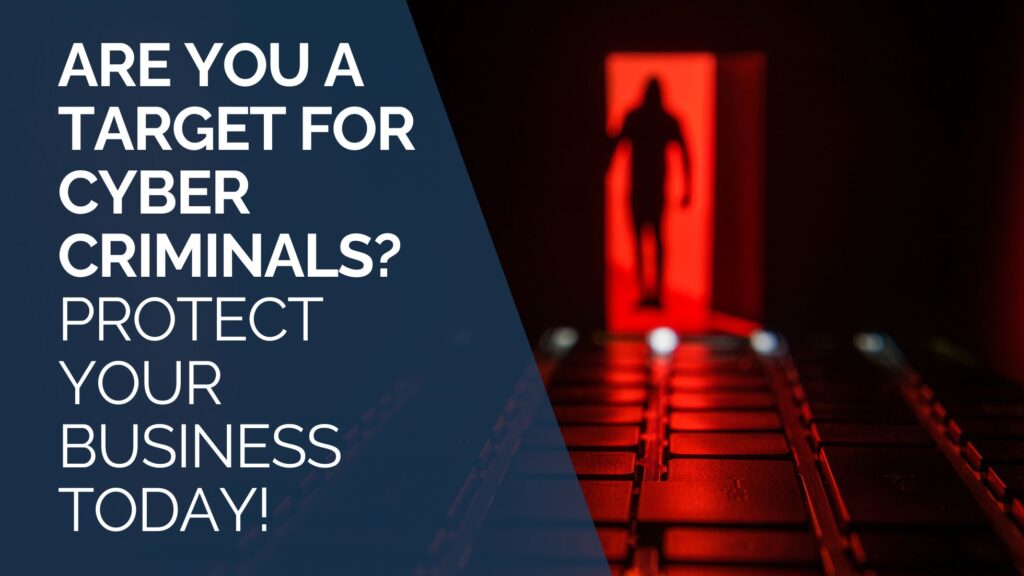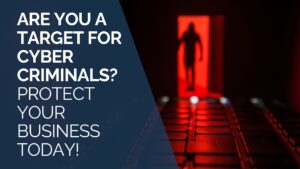
Cybercriminals are relentless in their pursuit of sensitive data, targeting businesses of all sizes and industries. But how do you know if you’re a target for cyber criminals? Understanding the risk factors and implementing robust cybersecurity measures can mean the difference between vulnerability and protection. Let’s explore why businesses are at risk and how you can safeguard your valuable assets.
Are You a Target for Cyber Criminals Part 1: Why Cyber Criminals Target Businesses
Cybercriminals don’t just target large corporations; small and medium-sized businesses are often in their crosshairs. Why? They’re seen as easy prey due to limited resources and weaker cybersecurity defenses.
High-Value Data That Cyber Criminals Seek
Businesses, especially those in healthcare, legal, and financial industries, possess a goldmine of sensitive information, including:
- Personally Identifiable Information (PII): Names, addresses, and social security numbers.
- Payment Details: Credit card numbers and transaction histories.
- Medical Records: Critical for healthcare-related cybercrime schemes.
Industries Most at Risk
While every business is a potential target, some industries face a higher threat level:
- Healthcare: With patient records fetching high prices on the dark web.
- Retail and eCommerce: For payment processing vulnerabilities.
- Finance: Due to access to bank accounts and sensitive financial data.
Are You a Target for Cyber Criminals Part 2: How to Identify Potential Cyber Threats
Knowing the warning signs of cyber threats can help you act swiftly and reduce damage.
Red Flags of Cyber Attacks
- Unexpected System Behaviors: Sluggish performance or unauthorized file changes.
- Phishing Emails: Messages that look legitimate but aim to steal your credentials.
- Unauthorized Login Attempts: Alerts of failed logins from unknown locations.
Common Entry Points for Cyber Criminals
- Weak Passwords: Easy-to-guess credentials like “123456” or “password”.
- Outdated Software: Vulnerabilities in unpatched systems.
- Unsecured Networks: Public Wi-Fi networks lacking encryption.
Are You a Target for Cyber Criminals Part 3: How to Protect Your Business from Cyber Criminals
Taking proactive measures to strengthen your cybersecurity can keep cyber criminals at bay.
Essential Cybersecurity Tools
- Firewalls: Act as your first line of defense.
- Antivirus Software: Detect and neutralize malware.
- Encryption: Protects sensitive data during transmission.
Best Practices for Employee Training
- • Train employees to recognize phishing emails and suspicious links.
- • Regularly update passwords and enforce multi-factor authentication (MFA).
- • Limit access to sensitive data based on roles and responsibilities.
Are You a Target for Cyber Criminals Part 4: What to Do if You Are Targeted
Even with the best defenses, no system is 100% foolproof. Here’s how to respond if you become a target for cyber criminals.
Steps to Take After a Cyber Attack
- Isolate Affected Systems: Prevent further spread by disconnecting compromised devices.
- Notify Stakeholders: Inform employees, clients, and relevant authorities.
- Engage Cybersecurity Experts: Conduct a thorough investigation and remediation.
Long-Term Security Strategies
- Conduct regular penetration tests to identify vulnerabilities.
- Stay updated on the latest cyber threats and adapt defenses accordingly.
- Partner with a Managed IT Services Provider (MSP) like Stringfellow Technology Group for ongoing protection.
Are You a Target for Cyber Criminals Part 5: FAQs
How do I know if I’m a target for cyber criminals?
Anyone handling valuable data is a potential target. Watch for phishing emails, weak system security, and unauthorized access attempts.
What industries do cyber criminals target the most?
Healthcare, retail, and finance are frequent targets due to the sensitivity of their data.
What are common cybersecurity mistakes businesses make?
Failing to update software, using weak passwords, and neglecting employee training.
How can small businesses protect themselves from cyber attacks?
Implement strong passwords, train employees, use firewalls, and encrypt data.
What should I do after a cyber attack?
Isolate the breach, notify stakeholders, and bring in cybersecurity experts for a detailed response.
Why is cybersecurity important for businesses?
It protects your assets, reputation, and ensures compliance with data protection laws.
So, are you a target for cyber criminals? The answer is likely yes, but that doesn’t mean you’re powerless. By understanding the risks, recognizing the warning signs, and implementing comprehensive cybersecurity measures, you can protect your business and its valuable data from malicious actors. Take action today to fortify your defenses and stay one step ahead of cyber threats.
And if your business is most likely a target, you deserve world-class managed IT services and support to help protect your client data. Reach out and let’s talk about the big picture and how cybersecurity fits into your overall business strategy.
Want more information? Check out our webinar on Cybersecurity and Patient Privacy below.

